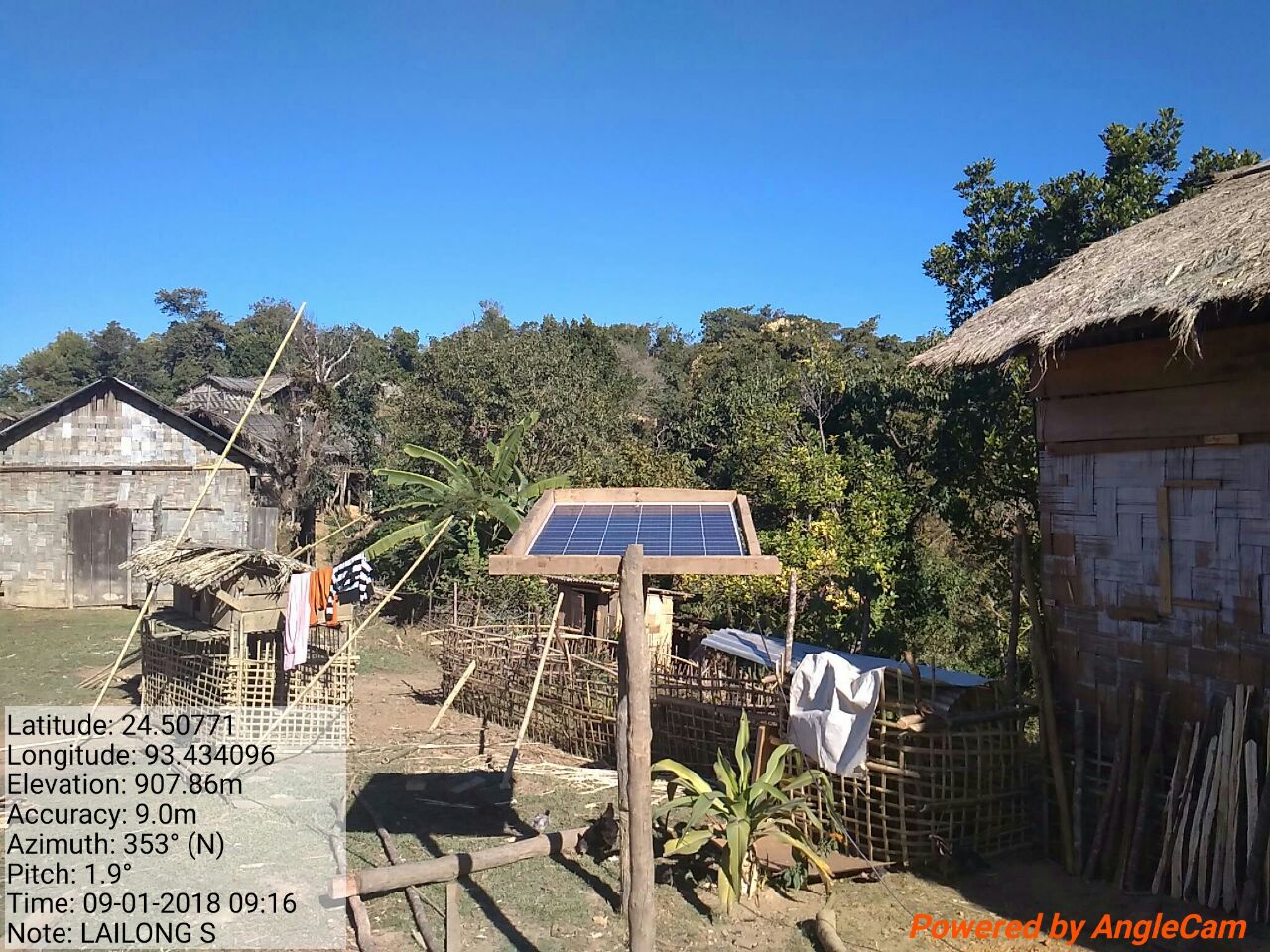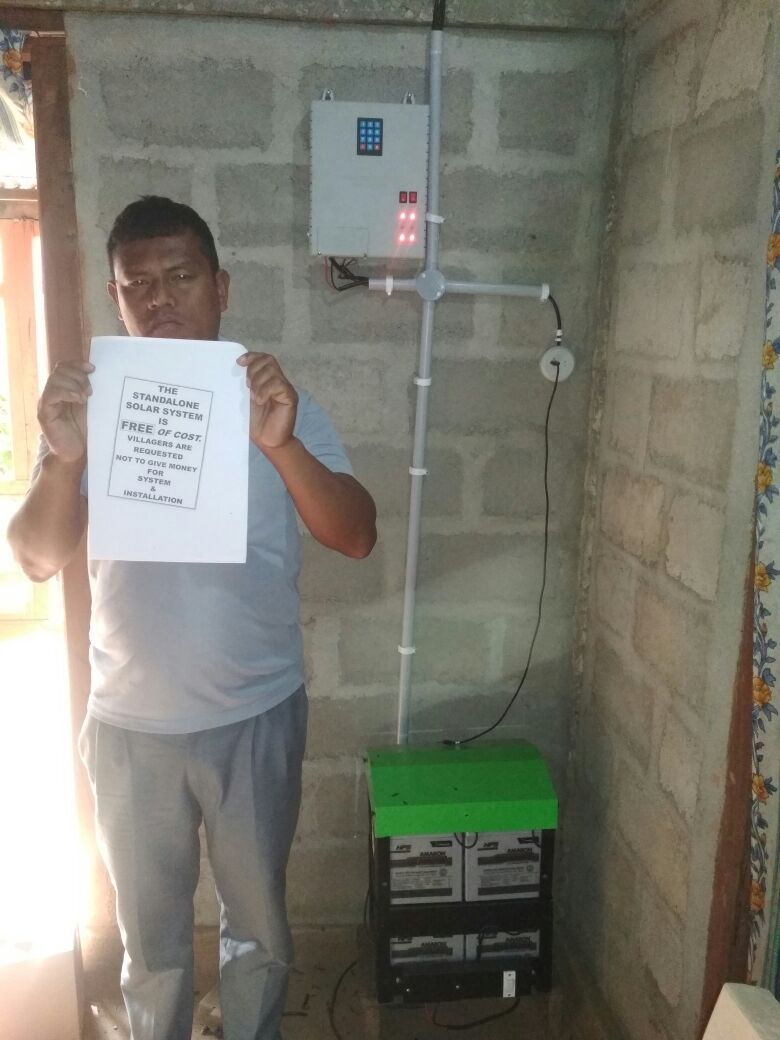IITM pioneering Solar DC technology lights up villages in remote corners of the country
Cygni Energy, an IITM incubated company, is installing solar units in the foreboding terrains of Manipur, Assam, Meghalaya, Jammu & Kashmir.

INN/Chennai, @infodeaofficial
Solar DC Inverterless Technology, pioneered by Indian Institute of Technology Madras Researchers, is lighting up homes in remote parts of the country where the terrain is so foreboding that they are beyond the reach of Electricity Grids.
Cygni Energy Private Limited, an innovative Solar-DC solutions startup that was incubated by the Rural Technology Business Incubator (RTBI) of IIT Madras, is now installing 3,026 units in villages located high up in remote corners of Manipur and another 25,000 units Solar inverters and lights in the villages of Assam.
Speaking about the importance of this Project, Prof. Ashok Jhunjhunwala, Institute Professor, IIT Madras, who lead the research on this technology, said, “It is of great importance that we have played major role in taking power to remote villages in Manipur, Assam, Meghalaya and J&K. Solar-DC system makes the equipment much smaller in size and cost. It has helped us in these difficult terrains where carrying anything would have been difficult. Powering homes with DC power-line reduces the power-consumption and would be increasingly deployed with solar in urban and rural India homes.”
The Manipur Project, taken up at a cost of Rs.11.5 crore, was funded by Manipur Renewable Energy Development Agency. Installation has been completed in 2,800 Homes. Most Beneficiaries are situated in remote, inaccessible mountainous regions of Manipur. This project resulted in electrification of 96 villages in places such as of Senapati, Ukhrul, Churachandpur, Chandel, Phrezawl, Thoubal and Tamenglong.
PROJECTS LIST & CURRENT STATUS
| PROJECT | TOTAL INSTALLATION | INSTALLATIONS COMPLETED |
| Assam Inverterless Project | 27,000 | 18,000 |
| Rajasthan Inverterless Project | 4,000 | 4,000 |
| Manipur Inverterless Project | 3,026 | 2,500 |
| Madhya Pradesh Inverterless project | 1,033 | 1,033 |
| Verizon Nalgonda project | 245 | 245 |
| Sasken Belgavadi project | 340 | 340 |
| Meghalaya Inverterless project | 210 | 210 |
| Jammu and Kashmir | 9,000 | 4,500 |
| TOTAL | 44,854 | 30,828 |
Speaking the project implementation, Mr. Venkat Rajaraman, CEO, Cygni Energy Private Limited, said, ““In 2018, India achieved its dream of electrifying every village and we are privileged to be a part of this challenging effort. Now, we have set our target on 100 per cent electrification of rural households. Our Solar-DC Inverterless product is a unique, disruptive product that is bringing about a paradigm shift in the way energy is generated and consumed. Our 48V DC was made a Standard for Low Voltage Direct Current (LVDC) electrification by the Bureau of Indian Standards (BIS) and also approved by the Ministry of New and Renewable Energy (MNRE), Government of India, for on-grid and off-grid solar applications.”

With Solar-DC solution, people are able to use power for 8 hours t full load and close to 12-14 hours in reserve mode [only basic appliances like bulb and mobile chargers]. The typical project involves installing the following items in each home:
- 1 Nos. 200 Wp PV Modules
- Solar-DC Inverterless Controller with 200Wp Load Capacity with 1.25 kWh Lithium Ion Battery
- 5 Nos. 5W bulbs
- 1 Nos. BLDC (Brushless DC) Fan
- 1 Nos. Remote for Fan
- 1 Nos. Mobile Charger
- 1 Nos. DC Socket
IIT Madras worked closely with Cygni to develop Inverterless technology. This product was built ground up with high efficiency and affordability in mind. The Challenges faced include:
* Last mile Transportation: This is one of the biggest challenges the implementation team faced while installing in the remote locations in Assam, Manipur and Jammu & Kashmir.
* Educating Customers to prevent System Tampering. The team is implementing Customer Training programs to counter it.
The project does not stop with just installing the units. There is also a Customer Training Program to educate the beneficiaries on the usage of the product. The sessions are generally conducted at a commons place like Village Chief’s home or a community hall. A Cygni Authorized Trainer demonstrates the good practices and basic user instruction on how to handle the Inverterless system. This includes details on how to turn the System ON and OFF and what each LED and buzzer sound indicate. This also includes how to reach the Cygni helpline in case of any issues and how to provide information to Cygni Service Personnel for easy identification and resolution of the problem.
The Solar-DC Inverterless technology, conceptualized and ideated by IIT Madras, uses complete DC solutions to remove AC to DC and DC to AC conversions. Removing the need of conversion helps in saving 30% to 40% of energy. This later provides more power backup with lesser size of batteries and solar panel which thus also contributes in reducing the cost of the system.
The Solar DC products are designed and developed in such a way that it can be easily installed in off-grid or near off-grid homes. This solution can also be seamlessly integrated with the AC grid power supply providing 24×7 power backup.
 A large number of homes (some estimates are up to 60 million homes) are still off-grid, and taking power-lines to these homes may be just too expensive. Many more have long power-cuts and could be categorized as near off-grid.
A large number of homes (some estimates are up to 60 million homes) are still off-grid, and taking power-lines to these homes may be just too expensive. Many more have long power-cuts and could be categorized as near off-grid.
While decentralized solar at the roof-tops to generate power could be an option for such homes, the costs of a conventional solar PV system to provide basic light and fans (and cell-phone charger) have been high primarily because of (i) poor design, (ii) high AC to DC and DC to AC conversion losses associated with such solar and battery systems and (iii) high costs of batteries.
Solar-DC systems would save about 35-40% of the power as compared to a solar-AC system. Add to it the energy-savings associated with DC appliances, huge gains in efficiency becomes possible. This efficiency gains translate to lower sized solar panel and smaller battery and therefore cost-savings when compared to a solar-AC system. Such a set-up offers an economical and affordable solution for off-grid/ near off-grid homes (homes with large power-cuts), and could also be useful for grid-connected homes in saving power-bills as well as providing back-up power.
This is achieved by Solar-DC Inverterless technology, conceptualized by IIT Madras. The Institute has implemented such decentralized Solar-DC systems within its campus as well as outside locations. In a nutshell, Solar-DC Inverterless Technology will aid homes gradually move towards a more DC world tomorrow.

